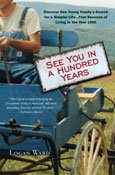It's a crazy dream that many people have: Sell everything you own and move out to a farm in the middle of nowhere. Most of us are content to just daydream about baking bread and finding freedom from 9-to-5 jobs and cable television bills. But Logan Ward and his wife followed through. "See You in a Hundred Years" (Delta, 2008, $13) follows the adventures of a busy New York City couple who decide to pack up with their young child and make their own way on a rural Virginia farm.
Here's the twist: The Wards did not move to just any farm. They moved to an 1885 farmhouse from which they removed the plumbing and disconnected the electrical wiring. They traded their car for one large horse. They chose to live like people in the year 1900, growing their own food, going to bed when darkness falls and using an outhouse. This book chronicles the author and his wife rushing to stay on schedule for their departure from the 21st-century, bickering about where to plant seeds and how to milk goats. "[T]he irony is that our little adventure was supposed to make us closer," Ward writes.
In June 2001, Logan, Heather and Luther Ward made the plunge, with an unplugged phone in a closet as their one safety net in case of emergencies. They were not willing to risk their lives, especially the life of their child, to maintain the rules of their experiment.
"The heightened risk of death—the child mortality rate in 1900 was fifteen times greater than it is today—is one aspect of the 1900 experience we don't care to recreate," Ward writes. Fortunately, Luther never suffers more than a passing fever during the entire year. Heather, on the other hand, uses the phone to call a doctor when she can no longer ignore her sharp abdominal pains.
The reader follows this adventurous family as they learn the ropes of feeding livestock, chopping wood, milking goats and firing up the wood stove—all before their cup of morning coffee. And the manual labor is not always as idyllic as it sounds. "I read somewhere that the number of kilowatt hours a typical family uses is equivalent to the work of 100 servants," Ward writes.
Before long, neighbors begin to stop by with expertise, advice and fresh produce to supplement their stocks of 1900 dry goods (tea, coffee, sugar, rice, oats, baking powder, soap) and a worm-filled cabbage crop.
By Thanksgiving and Christmas, the Wards have made lifelong friends and figured out how to grow and preserve a cornucopia of food to last the family through the winter, while continuing to enjoy sharing the bounty with neighbors and far-flung visitors and receiving generous bounty in return.
Winter brings long hours of sledding, reading aloud 19th-century novels by such favorites as Jane Austen and George Eliot, and writing letters to family and friends without the aid of Bic pens or laptops.
Before I was ready to stop reading, the Ward's year of old-fashioned life came to a close. There were many things that they had missed. "More than treats, I've been missing small things, like Scotch tape and Tupperware," Ward writes. But in their transition back to modern life, many lessons stuck with them, such as the value of family, community and self-sufficiency.
As a family, they weathered the personal hygiene of 1900, the shock of 9/11 without access to 24-hour news networks, a 12-mile round trip on old-fashioned bicycles to vote, a drought, a reversion to stereotypical gender roles, run-ins with the neighboring Boy Scout camp and menstrual periods without Ibuprofen.
Yet, despite an inauspicious start, they grew closer as a family, ate like kings and made a real life for themselves. We can learn a lot from the Ward family, and we can even do it without giving up our reading lights.
Previous Comments
- ID
- 145727
- Comment
OMG..... Wow, I could never be that brave... I'll read the book and take their lessons learned to heart...
- Author
- lanier77
- Date
- 2009-04-09T08:08:11-06:00



Comments
Use the comment form below to begin a discussion about this content.
comments powered by Disqus